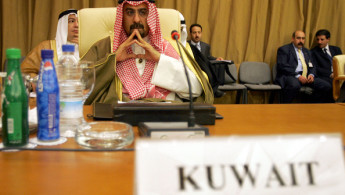Kuwait PM submits cabinet resignation following election
Kuwaiti Prime Minister Sheikh Mohammed Sabah al-Salem al-Sabah submitted his cabinet's resignation as expected to the Kuwaiti emir on Saturday, the state news agency reported.
The move comes after a new parliament was elected on Thursday and is a procedural one as the current government has to submit its resignation before the legislature's inauguration.
Kuwait's new Emir Sheikh Meshal al-Ahmad al-Sabah will now either reappoint the same prime minister or a new one who will be tasked with forming a new cabinet.
The OPEC producer, which bans political parties, has one of the most open political systems in the Gulf, though the emir has the final say in state matters.
Feuding between appointed governments and the elected parliament has often led to political paralysis.
Thursday's election was the fourth since December 2020.
The results of Thursday's poll showed only 11 new members of parliament, out of a total of 50 elected MPs in the Gulf Arab state.
The new emir is keen to push through economic reforms after protracted deadlock between appointed governments and elected parliaments hindered progress.
Sheikh Meshal's reform-minded approach, with scant tolerance for political bickering, appears aimed at helping the OPEC producer to catch up with Gulf neighbours which have been implementing ambitious plans to wean their economies off oil.
He strongly criticised the last National Assembly and the government in his first speech before parliament after taking office in December, saying they were "harming the interests of the country and its people".
The government of Sheikh Ahmed Al-Nawaf resigned hours after the speech. Sheikh Muhammad Sabah Al-Salem Al-Sabah formed a new government that included new ministers of oil, finance, foreign affairs, interior, and defence.
Sheikh Meshal, 83, succeeded his late brother Sheikh Nawaf Al-Ahmad in December and dissolved parliament on Feb. 15, less than two months into his tenure.
His decree cited the assembly's "violation of the constitutional principles" as a reason for dissolution.
Frequent elections limit voter ability to monitor parliamentarians and result in re-selecting the same candidates, political analyst Saleh al-Saeedi told news agency Reuters.
Successive votes "diminish the rate of change and offer less room for new faces to emerge", he said.
Results on Friday showed a single female candidate was elected, the same as in the previous parliament, while Shi'ite Muslim lawmakers secured eight seats in the predominantly Sunni Muslim Gulf Arab state, one more than last year.
Seats for the Islamic Constitutional Movement, which represents the Kuwaiti branch of the Muslim Brotherhood, fell to one from the previous three.





 Follow the Middle East's top stories in English at The New Arab on Google News
Follow the Middle East's top stories in English at The New Arab on Google News


